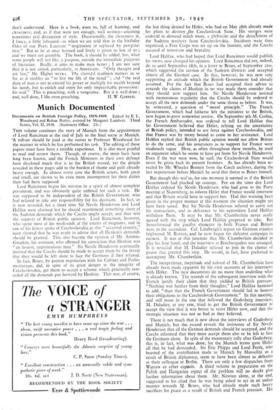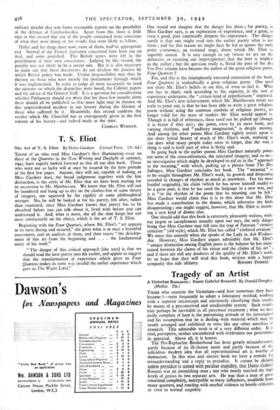Munich Documented •
Documents on British Foreign Policy, 1919-1939. Edited by E. L. Woodward and Rohan Butler, assisted by Margaret Lambert. Third Series, Vol. 11, 1938. (Stationery Office. 21s.) Tins volume continues the story of Munich from the appointment of Lord Runciman at the end of July to the final scene at Munich. *A tribute should be paid at the outset to Professor Woodward for the manner in which he has performed his task. The editing of these papers must have been a terrible experience. It is also most painful to read and review them. Though, of course, the main facts have long been known, and the French Ministers in their own defence have disclosed much that is in the British record, yet the details revealed in these pages add to the burden of shame and guilt already heavy enough. In almost every case the British actors, both great and small, arc shown to be even more incompetent for their duties than had been supposed.
Lord Runciman began his mission in a spirit of almost complete pessimism, and was obviously quite unfitted for such a task. He was supposed to be independent of the British Government, who had refused to take any responsibility for his decisions. In fact,-as is now revealed, for a short time Sir Nevile Henderson and Lord Halifax were alarmed lest he should recommend something short of the Sudeten demands which the Czechs might accept, and thus win the support of British public opinion. Lord Runciman, however, who spent most of his week-ends at the estates of magnates, and in one of his letters spoke of Czechoslovakia as this "accursed country," soon showed that he was ready to advise that all Henlein's demands should be granted. This also became the opinion of Mr. Ashton- Gwatkin, his assistant, who affirmed his conviction that Henlein was "an honest, unpretentious man." Sir Nevilc Henderson continually insisted that the Czechs should be made to accept them by the threat that they would be left alone to face the Germans if they refused.
In fact, Bcnes, by patient negotiation with his Cabinet and Parlia- mentarians, did, in spite of its great danger to the integrity of Czechoslovakia, get them to accept a scheme which practically con- ceded all the demands put forward by Henlein. This was, of course,
the last thing desired by Hitler, who had on May 28th already made his plans to destroy.sthe Czechoslovak State. His stooges were ordered to demand much more, a plebiscite and the detachment of the Sudeten territory from Czechoslovakia. Incidents were then organised, a Free Corps was set up on the frontier, and the Czechs accused of terrorism and brutality.
Lord Halifax, who had hoped that Lord Runciman would publish his views, now changed his opinion. Lord Runciman did not, indeed, do so until September 28th, in a letter to Bcnes, of September 21st, which suggested the cession of the Sudeten districts and accepted almost all the German ..ase. In this, however, he was now only supporting an attitude which the British Government had already assumed. For the fact that Bents had accepted their advice to concede the claims of Jienlein in no way made them consider that they should now support him. Sir Nevile Henderson insisted with monotonous regularity that the Czechs should be ordered to accept all the new demands under the same threat as before. It was, he reiterated, a question of " moral principle." The French Government, which had hitherto left the initiative to the British, now began to grow somewhat restive. On September 9th M. Corbin, the French Ambassador, was ordered to tell Lord Halifax that his Government believed that Hitler, relying on the uncertainty of British policy, intended to use force against Czechoslovakia, and that France was by treaty bound to come to her assistance. Lord Halifax replied that British public opinion would not allow Britain to do the same, and his assurances as to support for France were studiously vague Here, as often throughout these months, he used an argument which he seems to have got from Sir Nevile Henderson. Even if the war were won, he said, the Czechoslovak State would never be given back its present frontiers. As has already been re- vealed by Mr. Wheeler Bennett from the Czech archives, during the last negotiations before Munich he used this threat to Bcnes himself.
But though this watso, for one moment it seemed as if the British Government had plucked up courage. For on the same day Lord Halifax ordered Sir Nevile Henderson, who had gone to the Party meeting at Nuremberg, to inform Hitler that France would intervene and that Britain would have to support her. Had this warning been given in the proper manner at this moment the situation might yet have been saved. But Sir Nevile Henderson refused to carry out his instructions, and in deference to his opposition Lord Halifax withdrew them. It may be that Mr. Chamberlain never really agreed with the step which Lord Halifax proposed to take. But henceforward the pacifist elements in both France and Britain were in the ascendant. Col. Lindbergh's report on German aviation frightened M. Bonnet, and he now began his defeatist campaign in earnest. It was at this juncture that Mr. Chamberlain decided to play his lone hand, and the interview at Berchtesgaden was arranged. It is revealed that M. Daladier refused to join in the chorus of praise that greeted this step. He would, in fact, have preferred to accompany Mr. Chamberlain.
The inexperience, ineptitude and naivete of Mr. Chamberlain have already been made apparent by his own accounts of his interviews with Hitler. The new documents do no more than underline what is already known. The records of the subsequent interview with the French justify their claim that they yielded to British pressure. " Nothing was further from their thoughts," Lord Halifax hastened to add, " than that the French Government should fail to honour their obligations to the Czechoslovak Government." In this meeting, and still more in the one that followed the Godesberg interview, M. Daladier, at any rate, tried to get the British Government to accept the view that it was better to resist Hitler now, and that the strategic situation was not so bad as they believed.
There is not much that is new about the interviews of Godesberg and Munich, but the, record reveals the insistence of Sir Nevilc Henderson that all the German demands should be accepted, and the Czechs informed that they must accept them also or be left to face the Germans alone. In spite of the momentary rally after Godesberg, this is, in fact, what was done, for the Munich terms gave Hitler all that he had demanded. Sir Eric Phipps and Lord Perth, who boasted of the contribution made to Munich by Mussolini as a result of British diplomacy, seem to have been almost as defeatist as their colleague at Berlin. There are only a few dispatches from Warsaw or other capitals. A third volume in preparation on the Polish and Hungarian aspect of the problem will no doubt give further information about them. Mr. Newton alone, at the end, suggested to his chief that he was being asked to act in an unfair manner towards M. Bcnes, who had already made such heavy sacrifices for peace as a itsult of British and French pressure. His
military attache also sent home reasonable reports on the possibility of the defence of Czechoslovakia. Apart from this there is little sign in this record that any of the people concerned were conscious of what they were doing or the results that were likely to follow.
Hitler and his thugs have now, most of them, had'an appropriate end. Several of the French statesmen concerned have been put on trial, and some punished. The British actors were left to the
punishment of their own consciences. Judging by this record, the penalty was not likely to be .a severe one. But it is also necessary to point out that these documents do not disclose the process by which British policy was made. Undue responsibility may thus be thrown on those who were merely the instruments through which it was implemented. In order to judge all more accurately we need the minutes on which the dispatches were based, the Cabinet papers and the advice of the General Staff. It is a question for consideration whether Parliament should not insist that for these few months alone these should all be published so that more light may be thrown on this unprecedented incident in our history during the lifetime of those who suffered by it. Meanwhile, this record confirms the verdict which Mr. Churchill has so courageously given in the first volume of his history—and indeed made at the time.
CHARLES WEBSTER.















































 Previous page
Previous page